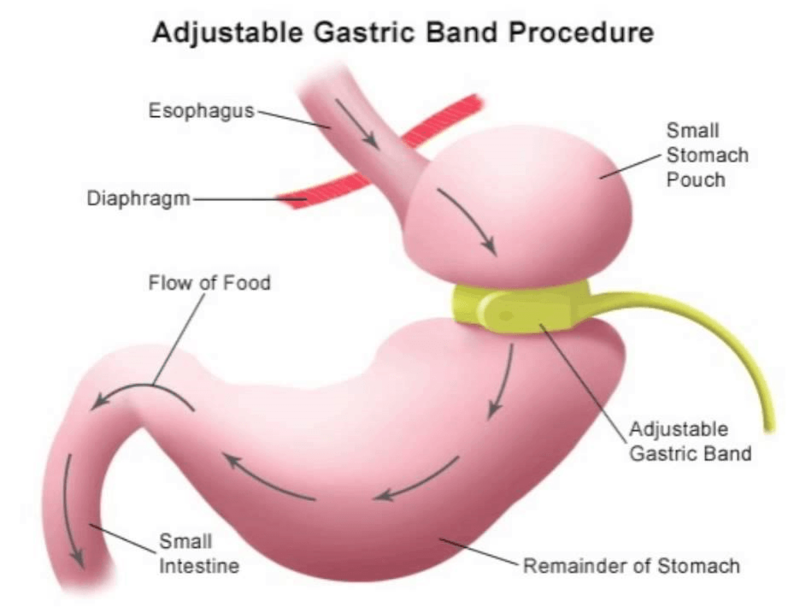Gastric Band Surgery in Morocco
Search and Compare the Best Clinics and Doctors at the Lowest Prices for Gastric Band Surgery in Morocco

Find the best clinics for Gastric Band Surgery in Morocco
No clinics available
Egypt offers the best prices Worldwide
Price: $ 435

- Home
- Morocco
Compare Before & After Photos of _procedure_photos.phpGastric Band Surgery


Front view


Front view


Front view


Front view
WHY US?
At Medijump, we're making medical easy. You can search, compare, discuss, and book your medical all in one place. We open the door to the best medical providers worldwide, saving you time and energy along the way, and it's all for FREE, no hidden fees, and no price markups guaranteed. So what are you waiting for?

Free

Best Price

Widest Selection

Risk-Free
What you need to know about Gastric Band Surgery in Morocco

Gastric band surgery is a procedure done under general anaesthesia where a silicon 'doughnut' is implanted into the upper part of the stomach. The operation is minimally invasive, carried out through a small incision, known as keyhole surgery. This methodology quickens the recovery time compared to open surgeries.
Post-operation, the band can be adjusted to be tighter or looser depending on the requirements. The recovery time varies depending on the individual patient's case, but often, patients can leave the hospital the same day. It is always crucial, however, to heed the advice of your doctor regarding your recovery.
The surgery functions as a control measure of the consumption capacity of the patient. Solid or dry foods, when consumed, will stay over the band longer prior to being mixed with saliva and passing down into the stomach. This results in elongated eating times, often up to three times the normal duration.
What is the cost of Gastric Band Surgery in Morocco?
The cost of Gastric Band surgery can differ greatly, with a broad estimate ranging from $7,400 to $33,000, excluding any insurance coverage. Factors such as your medical profile, specifics of the surgery, the clinic's standard costs, and the fees of the surgeon determine this cost.
Additional costs like pre-surgery tests, post-surgery drugs, and essential consultations form an integral part of this estimated cost. The most reliable way to get a precise cost is to contact your healthcare provider directly. Most insurance policies cater to weight-loss surgery costs, although their coverage and prerequisites can vary. Costs of learning about post-surgery health benefits, potential risks, and dietary guidance should also be factored into the overall expense.
What does a Gastric Band Surgery Procedure Involve?
Gastric Band Surgery involves putting a band on your stomach's upper part to form a tiny pouch where food sits after consumption. Following this surgery, you can't eat big portions of food at once. This pouch fills up rapidly when you eat hence making you feel full much quicker. Therefore, you'll eat less and more slowly, which is beneficial for weight loss.
Your doctor can adjust the gastric band's tightness or looseness by injecting fluid into it through a small opening beneath your skin. This determines the speed at which food moves from your pouch to the rest of your stomach and is aimed at facilitating a steady weight reduction.
The effectiveness of the gastric band surgery largely depends on your lifestyle changes after the surgery. Embracing a healthy diet, becoming more physically active, and avoiding excessive consumption of high-calorie drinks like alcohol are crucial for the surgery's success. These drinks can bypass the band, leading to weight gain even after surgery.
How Long Should I Stay in Morocco for a Gastric Band Surgery Procedure?
Often, patients are discharged the day after the operation however, it is advisable to stay a minimum for a week to allow for a postoperative check and follow-ups with the doctor.
What's the Recovery Time for Gastric Band Surgery Procedures in Morocco?
For Gastric Band Surgery methods in Morocco, the restoration time frame can vary among patients. However, most individuals can commonly resume normal activities one week following the system. Few may additionally require a bit more time, about 1-2 weeks, to go back to day by day sports and employment.
What's the Success Rate of Gastric Band Surgery Procedures in Morocco?
The achievement rate of Gastric Band Surgery procedures can range primarily based on numerous factors just like the character's age, preliminary weight, dedication to way of life alterations, and the presence of other health situations. Generally, however, many medical research suggest exceptional long-time period weight reduction effects.
It's important to not forget that Gastric Band Surgery is a tool to help you shed pounds. In the give up, the achievement of the system will heavily rely upon your determination to making the specified way of life adjustments that contain vitamins and exercise. Obtaining expert guidance in these regions can substantially fasten the process.
What sort of Aftercare is Required for Gastric Band Surgery Procedures in Morocco?
The aftercare process for Gastric Band Surgery strategies in Morocco comprises numerous steps. You would want to stick to a particular prescribed weight-reduction plan, starting up with liquid meals and progressively incorporating pureed after which solid foods. This sluggish transition helps your belly alter to its new size and forestalls complications like stretching the pouch or band slippage.
Additionally, regular exercising and conferences with dietary and mental fitness professionals would form important parts of your aftercare. Regular follow-ups with your healthcare provider also is an important part of the aftercare, allowing the tracking and vital adjustments of your band to ensure powerful weight loss and minimal headaches.
Are there Alternatives to Gastric Band Surgery Procedures in Morocco?
Yes, numerous options to the Gastric Band Surgery are available in Morocco. Some alternatives may also contain non-surgical strategies like food plan and workout plans, prescription medicinal drugs, weight-control bariatric-surgical procedure and different bariatric techniques like gastric pass, gastric sleeve, and duodenal switch operations.
However, consulting with your doctor is advisable. Additionally you may check your health and appropriate weight loss approach for you.
What Should You Expect Before and After the Procedure?
Before the process, you must go through a comprehensive medical assessment to deem your suitability for the treatment. Your doctor may additionally suggest you a weight loss program and exercise routine to make the process simpler to perform.
After the manner, expect modifications challenging for your physique but additionally to your way of life. You'll need to comply with a strict diet regime, exercise mechanically, and frequently monitor your progress along with your healthcare provider. Remember, your Gastric Band Surgery is an useful resource to weight reduction however dedication to life-style change is the key to long-term fulfillment.
How Safe is the Gastric Band Surgery in Morocco?
There is continually a hazard associated with any surgical treatment, and the Gastric Band Surgery in Morocco is not any distinct. However, because it's far minimally invasive and commonly achieved laparoscopically, the associated risks are significantly lower in comparison to other surgical weight loss treatments. The technique also avoids intestinal rerouting, reducing complications like malabsorption and diet deficiencies.
Common ability complications consist of band slippage, pouch enlargement, and band erosion, that could require comply with-up techniques. Rarely, greater critical complications may also arise, which includes contamination, blood clots, or complications from anesthesia. It's vital to speak about capacity risks and headaches together with your doctor earlier than your method to make knowledgeable selection about the operation.
What are the Potential Long-term Outcomes of Gastric Band Surgery in Morocco?
The potential results of a Gastric Band Surgery operation is widespread weight reduction, frequently resulting in advanced widespread health and a decrease in weight problems-associated illnesses like high blood pressure, type 2 diabetes, and sleep apnea. You can anticipate to lose approximately 40-60% of your excess weight inside the first 12 months, with solid weight reduction generally executed 18-24 months put up-procedure.
Incorporating life-style changes, which includes a diet regime and ordinary physical activity, is certainly essential for maintaining your new weight and normal health. Continual follow-ups with your doctor will even help make sure that your gastric band is running efficaciously and address any ability issues. Remember, weight loss surgical treatment isn't a brief restore but the start of an ongoing adventure towards a more healthy way of life.
What Impact does a Gastric Band Surgery have on Nutrition and Exercise?
Following a Gastric Band Surgery, your weight-reduction plan will trade substantially. The size of the brand new belly pouch way you will be restrained to ingesting tons smaller meals. Your doctor will usually offer a detailed put up-operative diet regime, often starting with drinks, shifting directly to pureed ingredients, and then to regular ingredients through the years. As your body adjusts to the brand new stomach structure, it's essential to make sure that meals are nutrient-dense to meet nutrients needs.
Overeating or ingesting the incorrect varieties of food can cause soreness or vomiting. You may want to take vitamin and mineral supplements to prevent deficiencies due to reduced meals intake. Exercise is also a critical thing of a wholesome way of life following a Gastric Band Surgery. An exercise software tailor-made for individual abilities and choices can help with the protection of muscle mass, growth electricity expenditure, enhance nicely-being, and similarly promote weight loss.
How can this treatment benefit Your Mental Health?
Undergoing a Gastric Band Surgery procedure also can make a contribution toward an improvement in intellectual health. According to the World Journal of Psychiatry, bariatric surgery may also reduce signs and symptoms of melancholy and tension, which can be generally skilled through human beings with weight problems.
However, it's vital to bear in mind that last emotionally balanced during the submit-surgical operation duration might be challenging due to lifestyle changes, feasible headaches, or unrealistic expectations approximately weight loss. Therefore, acquiring intellectual health help, such as therapy or counseling, may be critical to handling these mental elements and making sure a a hit transition for your new life-style.
Whilst the information presented here has been accurately sourced and verified by a medical professional for its accuracy, it is still advised to consult with your doctor before pursuing a medical treatment at one of the listed medical providers
No Time?
Tell us what you're looking for and we'll reachout to the top clinics all at once
Enquire Now

Popular Procedures in Morocco
Prices Start From $1

Prices Start From $359

Prices Start From $75

Prices Start From $435

Prices Start From $777

Recommended Medical Centers in Morocco for procedures similar to Gastric Band Surgery

- Interpreter services
- Translation service
- Religious facilities
- Medical records transfer
- Medical travel insurance
- Health insurance coordination
- TV in the room
- Safe in the room
- Phone in the room
- Private rooms for patients available

- Interpreter services
- Translation service
- Religious facilities
- Medical records transfer
- Medical travel insurance
- Health insurance coordination
- TV in the room
- Safe in the room
- Phone in the room
- Private rooms for patients available

- Interpreter services
- Translation service
- Religious facilities
- Medical records transfer
- Medical travel insurance
- Health insurance coordination
- TV in the room
- Safe in the room
- Phone in the room
- Private rooms for patients available

- Interpreter services
- Translation service
- Religious facilities
- Medical records transfer
- Medical travel insurance
- Health insurance coordination
- TV in the room
- Safe in the room
- Phone in the room
- Private rooms for patients available

- Interpreter services
- Translation service
- Religious facilities
- Medical records transfer
- Medical travel insurance
- Health insurance coordination
- TV in the room
- Safe in the room
- Phone in the room
- Private rooms for patients available

- Interpreter services
- Translation service
- Religious facilities
- Medical records transfer
- Medical travel insurance
- Health insurance coordination
- TV in the room
- Safe in the room
- Phone in the room
- Private rooms for patients available

- Interpreter services
- Translation service
- Religious facilities
- Medical records transfer
- Medical travel insurance
- Health insurance coordination
- TV in the room
- Safe in the room
- Phone in the room
- Private rooms for patients available

- Interpreter services
- Translation service
- Religious facilities
- Medical records transfer
- Medical travel insurance
- Health insurance coordination
- TV in the room
- Safe in the room
- Phone in the room
- Private rooms for patients available

- Interpreter services
- Translation service
- Religious facilities
- Medical records transfer
- Medical travel insurance
- Health insurance coordination
- TV in the room
- Safe in the room
- Phone in the room
- Private rooms for patients available

- Interpreter services
- Translation service
- Religious facilities
- Medical records transfer
- Medical travel insurance
- Health insurance coordination
- TV in the room
- Safe in the room
- Phone in the room
- Private rooms for patients available
Gastric Band Surgery in and around Morocco
About Morocco
Morocco is a popular destination, attracting culture lovers, backpackers, adventure travelers, couples, families, foodies, and more to its four imperial cities: Marrakesh, Fes, Meknes, and Rabat. Rabat is the current capital city. Although a modern city at first glance, it has several interesting historical attractions, such as the Kasbah of the Oudaias, the old medina, and the Hassan Tower. The gleaming Royal Mausoleum is also well worth a visit. Known as the Red City, Marrakesh is famous for its old medina, numerous souks, ancient palaces like Badi Palace and Bahia Palace, the striking Koutoubia Mosque, the energetic Djemaa el-Fna, and the Saadian Tombs. The former capital of Fes boasts plenty of stunning architecture, though it is perhaps most known for its large tanneries and for being home to one of the oldest universities in the world. Meknes has one of the most impressive monumental gates in all of Morocco, Bab el-Mansour. Horse-drawn carriages are a great way to explore the charming and relaxed imperial city. Morocco has beaches along both the Mediterranean Sea and the Atlantic Ocean. Popular holiday spots with foreign visitors include Tangier and Agadir, while Asilah attracts mainly locals and Spanish visitors. The vast Sahara Desert is the world’s largest hot desert. There are several places in Morocco from where you can begin expeditions into the desert, and there are plenty of experienced operators offering trips to remember.
The country welcomes an ever-increasing number of medical tourists each year, many of which travel for Gastric Band Surgery procedures. Medical Tourists travel from all across the globe, particularly from neighboring African countries with an inferior healthcare system. Casablanca and Marrakesh are the popular cities and they mostly cater to dentistry and plastic surgery requirements
Popular Parts of Morocco
Morocco, with a population of over 35 million people, is known to be magical and chaotic. The country is very diverse, from Saharan Dunes, High Atlas, ancient medinas, friendly locals to traditional life; Morocco has everything for every tourist.
- Marrakesh is also known as the red city because of its famous red walls, plazas, and alleys. It has a beautiful medina (old town) where tourists can wander around, be amazed by the historical city, and explore and shop in the souks. Visit Djamaa el-Fina and find street performers, musicians, and tattoo artists.
- Fez is considered as Morocco’s cultural and spiritual center. The city is filled with museums, mosques, palaces, and fountains. The most popular attraction is the medina, tourists can explore the tiny streets and find an array of street vendors. Remember to try the amazing local cuisine and stay away from wandering down empty streets.
- Tangier is located in northwestern Morocco on the Maghreb coast. It offers a breathtaking waterfront where you can see the Mediterranean Sea meets the Atlantic Ocean. The city is known to be Europe’s gateway to Africa. It has a fascinating cultural landscape as well as an inviting literary and artistic past.
- Casablanca is the biggest city and the least popular tourist’ destination in Morocco. But the city is actually full of hidden gems. From Art Deco architecture, beaches, markets, to history and culture, tourists will find many amazing things to see here.
- Rabat is often overlooked by tourists. It is the political and administrative capital of Morocco that offers plenty of charm. Tourists are free to roam around the Tower of Hassan, enjoy a day at the calm beach, or admire the big medina.
Weather and Climate in Morocco
Morocco’s climate is generally moderate and subtropical with cool breezes from the Atlantic and the Mediterranean Sea. Temperature varies greatly depending on region and altitude. Summer lasts from June to August and is often really hot. Winter comes in November and ends in January. It is the wettest and coldest season in the country. The best time to visit is in Spring and Autumn where the weather is warm and pleasant.
The coastal regions have nice weather throughout the year, the Winter has mild temperature and although the temperature will rise in the Summer, it’s not too hot. The High Atlas Mountains can be visited all year round but the winter can get really cold. There will be snow on the peaks during Winter. The summer can be a little too hot for any long-distance hike.
Getting Around in Morocco
Morocco’s main gateway is Casablanca's Mohammed V International Airport. The airport is located in Nouaceur Province and is the busiest airport in the country. It is the hub for Air Arabia Maroc, Royal Air Maroc. It serves domestic and international flights to and from many cities in the Middle East, Europe, and America. Major and budget airlines operate flights from this airport. Other important airports include Menara airport in Marrakesh, Fes–Saïss in Fez, Ibn Batouta International in Tangier.
There are several options for tourists to travel to downtown Casablanca. Buses are affordable, a single ticket costs 20.00 MAD. It will take around 45 minutes to get to the city center. There’s also a bus line that will take tourists to Rabat.
Casablanca Airport has an underground train station that connects to Mers Sultan, Casa Port, Casa-Voyageurs or L’Oasis. The total trip time to downtown Casablanca is 45 minutes. The trains operate from 06.00 am to 10.00 pm.
Taxis are the most convenient mean of transportation, but they’re also more expensive than trains and buses. The base fare is around 250.00 MAD to 300.00 MAD (25 to 30 USD). Always avoid non-authorized taxis because they are known to overcharge. Refuse to board a taxi with broken or turned off meters. Remember that Casablanca official taxis are painted in white.
The most efficient and affordable way to get around Morocco is by the intercity buses. The most popular operators are Supratours, CTM, SATAS, and Ghazala. A ride from Marrakesh to Casablanca is around 4 hours and should cost 90 MAD (9 USD).
Morocco’s national rail network is operated by ONCF and connects major cities like Marrakesh, Casablanca, Fez, and Rabat. The trains are usually on-time and comfortable. First-class tickets cost about 45 MAD (5 USD) per hour and the second class tickets cost around 30 MAD (3 USD).
Tourist Visas in Morocco
Citizens of Australia, New Zealand, Canada, the United States, the European Union, Britain, Japan, and South Africa do not need a visa to enter the country. Citizens of 66 countries can enter and stay in Morocco for up to 90 days. Citizens of the Republic of the Congo, Guinea, and Mali do not require a visa but must obtain an Electronic Travel Authorization in advance.
It is recommended to check the current regulations with the Moroccan Embassy or Consulate in your country. All visitors must hold a passport valid for over 6 months at the entry date.
Additional Information
- Local Currency: The official currency if Moroccan Dirham (MAD). The exchange rate from 1 USD is 9.70 MAD.
- Money & Payments: Tourists can find many ATMs spread around the country and they are the easiest way to access money. Credit cards are accepted in top-end hotels and restaurants. Always carry some cash with you. Many Moroccan riads will accept euros. Tipping can sometimes be mandatory. It is not necessary to tip taxi drivers, but it is polite to do so.
- Local Language: There are two official languages in Morocco; Modern Standard Arabic and Amazigh (Berber). French is widely understood and spoken in the country. Many people in the northern and southern parts of the country can speak Spanish. English is not widely spoken but some people in tourist and urban areas can speak English. Most street signs are written in Arabic and French.
- Local Culture and Religion: The majority of Morocco’s population follows Islam. Christianity, Judaism, and Baha’i Faith are freely practiced. The country has a conservative dress code. Avoid wearing revealing clothes regardless of the season.
- Public Holidays: Islam religious holidays are celebrated in Morocco. The country hosts several annual festivals such as Marathon des Sables, Kelaa-des-Mgouna Rose Festival, and Marrakesh Popular Arts Festival.
Popular Searches
- Plastic Surgery in Thailand
- Dental Implants in Thailand
- Hair Transplant in Thailand
- Breast Augmentation Thailand
- Gastric Sleeve in Thailand
- Gender Reassignment Surgery in Thailand
- Laser Hair Removal in Bangkok
- Botox in Bangkok
- Dermatology in Bangkok
- Breast Augmentation in Bangkok
- Coolsculpting in Bangkok
- Veneers in Turkey
- Hair Transplant in Turkey
- Rhinoplasty in Turkey
- Stem Cell Therapy in Mexico
- Rhinoplasty in Mexico
- Liposuction in Mexico
- Coolsculpting in Tijuana
- Rhinoplasty in Korea
- Scar Removal in Korea
- Gastric Sleeve in Turkey
- Bone Marrow Transplant in India
- Invisalign in Malaysia
- Plastic Surgery in the Dominican Republic
- Tummy Tuck in the Dominican Republic
- Plastic and Cosmetic Surgery in Poland
- Rhinoplasty in Poland
- Hair Implant in Poland
- Dental Implants in Poland
- IVF in Turkey